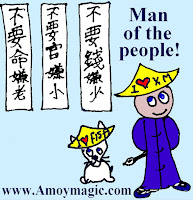
Ahoy from
Amoy! (
Xiamen, China)
Some think Chinese lack a sense of humor because they did not have a Chinese word for "humor" until the 20th century writer from
Amoy, Lin Yutang 林语堂 created the word "Youmo" (Lin Yutang also invented the Chinese typewriter). Youmo 幽默 sounds similar to "humor" but it literally means You (hidden, the underworld) and Mo (silent, or to write from memory). Strange word! But Chinese in fact do have a very strong sense of humor which I hope to share in this blog with ancient Chinese jokes and contemporary examples of Chinese sense of humor.
I especially love Chinese puns (双关语--double-meaning word). Chinese only has 400 distinct sounds; the sense comes from the 4 tones and the context. So Chinese is easier to pun with than English. My favorite Chinese pun is the one for "henpecked." In Chinese, henpecked is Qiguanyan 妻管严, which sounds like Qiguanyan (气管炎inflammation of the windpipe) but with a deft switch in tone means strict control by the wife.
My wife Susan Marie says that if I keep up with puns like that, she may take
punitive measures (punitentiary, perhaps?).
Because of the few distinct sounds, and the fact that many (maybe most) Chinese use the tones incorrectly (surprise, but it's true), it's very easy to inadvertently create a pun--or at least a humorous misunderstanding.
Amoy (Xiamen) was home to the Amoy Mission (China's first Protestant church, mission hospital, etc.) and one early missionary asked his Chinese cook to prepare chicken (ji) that night. The surprised cook left and did not return for 3 days. He said, "I'm sorry, but I could not find anyone willing to marry a foreigner." He thought the missionary had asked for a wife (qi), not chicken (ji).
Talking Turkey When we arrived in Amoy in 1988, I had a tough time getting locals to understand I wanted to buy a turkey (huo ji). They thought I wanted "matches," or "live chicken," or "freight truck," or.... Only when I gobbled (which I do very well, having worked many years with turkeys), did they laugh and say, "Oh, huo ji! Why didn't you say so?"
So Chinese puns, whether deliberate or not, are legion and lethal. But I'll not burden you with puns, but share my favorite ancient and modern jokes, funny experiences, and perhaps even some very funny translations (which foreigners laugh at, but I appreciate that the Chinese at least attempt to use English; in countries like Thailand, very little is in English!).
Enjoy
Amoy!
Dr. Bill
Academic Director, XMU OneMBA
www.amoymagic.com
 Chinese revere Buddhism but they're not above joking about it. After all, as the woodcarver once admitted, "He who carves the Buddha does not worship him." I especially like this joke, which is about the evil Beelzebug (mosquitoes, you know, are the deadliest creature on the planet, killing more people each year than any other creature--and the link between mosquitoes and malaria was discovered right here in Amoy in the late 1800s, which is why Gulangyu Islet is know as "The Cradle of Tropical Medicine").
Chinese revere Buddhism but they're not above joking about it. After all, as the woodcarver once admitted, "He who carves the Buddha does not worship him." I especially like this joke, which is about the evil Beelzebug (mosquitoes, you know, are the deadliest creature on the planet, killing more people each year than any other creature--and the link between mosquitoes and malaria was discovered right here in Amoy in the late 1800s, which is why Gulangyu Islet is know as "The Cradle of Tropical Medicine").



